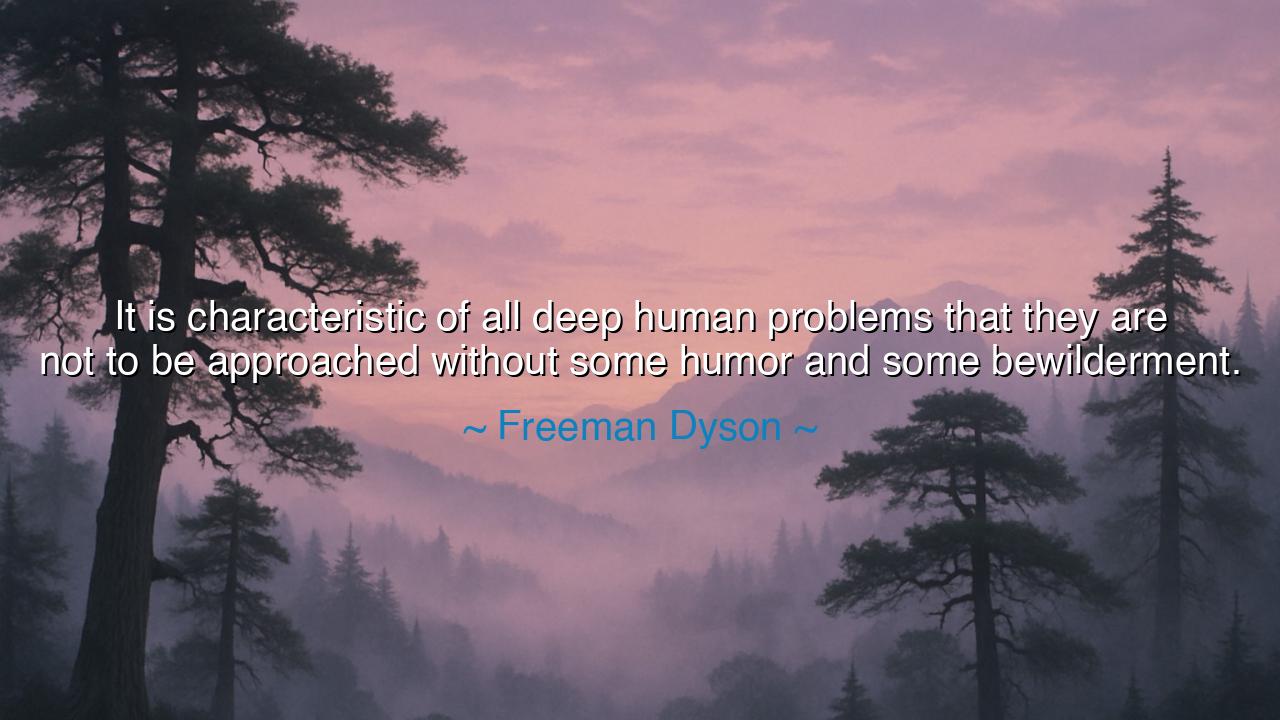
It is characteristic of all deep human problems that they are not
It is characteristic of all deep human problems that they are not to be approached without some humor and some bewilderment.






“It is characteristic of all deep human problems that they are not to be approached without some humor and some bewilderment.”
Thus spoke Freeman Dyson, the wise physicist whose mind bridged the realms of science and philosophy, a man who saw that wisdom is not the absence of confusion but the art of moving through it. In this saying lies a truth that transcends time: that the deepest problems of humanity—those of love, meaning, suffering, and truth—cannot be solved by logic alone. They demand humility, laughter, and the acceptance that not all mysteries are meant to be tamed. Dyson, in his insight, reminds us that the soul’s most difficult journeys require not only intellect, but humor to soften the edges of despair, and bewilderment to keep us humble before the unknown.
To approach great problems without humor is to grow hard and bitter; to approach them without bewilderment is to grow arrogant and blind. Humor lightens the heart, allowing wisdom to enter; bewilderment opens the mind, allowing truth to expand. The two together form the compass of the seeker — laughter guarding against despair, confusion guarding against pride. Dyson, though a man of reason, understood that pure reason is not enough. For what is the human mind but a flickering flame before the vast winds of mystery? The one who dares to face life’s greatest questions must learn to laugh gently at their own ignorance and stand in awe before the immensity of creation.
This truth is as old as civilization. The ancient Socrates, when hailed as the wisest man in Athens, declared that his wisdom consisted only in knowing that he knew nothing. There was bewilderment in his humility, but also humor in his tone — a smile toward the folly of those who believed themselves all-knowing. He saw that the pursuit of truth begins in confusion and matures in irony. To laugh at oneself is to acknowledge the limits of the human mind, yet also to celebrate the wonder of its striving. For the gods, it was said, punished hubris — the pride of certainty — but smiled upon the one who sought wisdom with laughter in their heart.
Even in the modern age, this lesson has not dimmed. Consider Albert Einstein, who once said, “If you can’t explain it to a six-year-old, you don’t understand it yourself,” and who often laughed at his own equations, calling himself “confused but curious.” He too embodied Dyson’s teaching. For all his brilliance, Einstein never claimed mastery over the mysteries of the cosmos; instead, he danced with them — bewildered, amused, reverent. His humor was not lightness of mind but lightness of spirit — a sign that even the greatest intellect must bow before the infinite with both laughter and awe.
When Dyson speaks of “deep human problems,” he refers not only to science or philosophy, but to the eternal struggles of being alive — the search for love, the fear of death, the quest for justice, the meaning of suffering. These are not problems to be “solved,” but conditions to be understood, lived through, and embraced. To approach them with humor is to protect the heart from despair; to approach them with bewilderment is to protect the mind from arrogance. The human condition is a paradox — finite beings reaching for the infinite, fragile souls seeking immortality in meaning. Humor and bewilderment are the twin wings that carry us through that paradox without breaking.
Indeed, history teaches that those who faced the world’s greatest trials without laughter perished in spirit, while those who kept humor alive endured. In the darkness of war, Viktor Frankl, imprisoned in a Nazi concentration camp, found that even amidst horror, laughter could preserve the essence of humanity. “Humor,” he wrote, “is another of the soul’s weapons in the fight for self-preservation.” And though he was bewildered by suffering beyond comprehension, that very bewilderment opened him to faith — to the realization that life’s deepest meaning often lies beyond reason’s reach. Frankl lived what Dyson described: the strength born from laughter in sorrow and humility in the face of the unfathomable.
So let this teaching be your guide:
-
When life confuses you, let bewilderment soften you — for confusion is the first step toward deeper understanding.
-
When life wounds you, let humor heal you — for laughter is a light that no darkness can extinguish.
-
Do not seek to conquer life’s mysteries, but to walk with them — with a smile and a questioning heart.
-
Embrace humility, for the universe is vast, and wisdom dwells only in those who remain teachable.
Thus, the wisdom of Freeman Dyson shines as a torch in the long corridor of human striving: that the great questions of existence are not puzzles to be solved, but symphonies to be heard with both reverence and mirth. In the face of confusion, let us laugh. In the face of mystery, let us wonder. For those who carry both humor and bewilderment in their hearts walk not as masters of life, but as its truest students — and that, in the end, is the beginning of wisdom.






AAdministratorAdministrator
Welcome, honored guests. Please leave a comment, we will respond soon